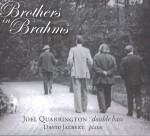 At the time of writing, the outstanding Toronto double bassist and former TSO principal Joel Quarrington is about to take up his new position as principal bassist of the London Symphony Orchestra. His latest CD with pianist David Jalbert on the Modica Music label, Brothers in Brahms (MM013), consequently has somewhat of a parting gift feel about it, having been recorded at the CBC’s Glenn Gould Studio just this past March and released in June. The title comes from a concert program that the Toronto RCM’s ARC Ensemble presented ten years ago, in which Quarrington was asked to play the Double Bass Sonata Op.97 by Brahms’ contemporary and friend Robert Fuchs. Quarrington had never heard of Fuchs or the sonata, but was quite taken with it, and eventually chose to record it by following the ARC Ensemble’s original program idea, pairing it with his own transcriptions of works by Brahms and Robert Schumann.
At the time of writing, the outstanding Toronto double bassist and former TSO principal Joel Quarrington is about to take up his new position as principal bassist of the London Symphony Orchestra. His latest CD with pianist David Jalbert on the Modica Music label, Brothers in Brahms (MM013), consequently has somewhat of a parting gift feel about it, having been recorded at the CBC’s Glenn Gould Studio just this past March and released in June. The title comes from a concert program that the Toronto RCM’s ARC Ensemble presented ten years ago, in which Quarrington was asked to play the Double Bass Sonata Op.97 by Brahms’ contemporary and friend Robert Fuchs. Quarrington had never heard of Fuchs or the sonata, but was quite taken with it, and eventually chose to record it by following the ARC Ensemble’s original program idea, pairing it with his own transcriptions of works by Brahms and Robert Schumann.
The Brahms might stop you in your tracks at first hearing: it’s the Violin Sonata No.1 in G Major, Op.78; a work you wouldn’t think would be able to survive a drop of a couple of octaves for the solo part. It takes a bit of getting used to, but soon assumes a character of its own and does work very well. Quarrington rightly stresses the singing nature of the solo part in his booklet notes and more than justifies this observation with his playing.
The transcription of Schumann’s beautiful Adagio and Allegro Op.70 for French horn is more immediately successful, but the main interest here is the Fuchs sonata. It’s a terrific work, with a cello-like quality much of the time, and quite Brahmsian in style — lyrical, Romantic, lush and passionate. As the original three movements are all Allegro, Quarrington chose to add the Andante from Fuchs’ Three Pieces for Contrabass and Piano Op.96 as a slow third movement; it works extremely well.
Quarrington’s playing throughout the CD is superb, combining virtuosity and musicianship with a tone and agility that are at times quite astonishing. Jalbert is his equal in all respects, and the recorded sound and balance are faultless.
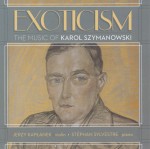 Polish-born violinist Jerzy Kaplanek is a member of the Waterloo-based Penderecki String Quartet and associate professor in the Faculty of Music at Wilfrid Laurier University. On his new CD Exoticism – The Music of Karol Szymanowski (Marquis MAR 437), he is joined by pianist Stéphan Sylvestre, associate professor of piano at Western University, in a recital of works by his compatriot.
Polish-born violinist Jerzy Kaplanek is a member of the Waterloo-based Penderecki String Quartet and associate professor in the Faculty of Music at Wilfrid Laurier University. On his new CD Exoticism – The Music of Karol Szymanowski (Marquis MAR 437), he is joined by pianist Stéphan Sylvestre, associate professor of piano at Western University, in a recital of works by his compatriot.
Kaplanek readily admits that he feels he has known and understood Szymanowski’s music since his childhood days; it’s certainly borne out by his exemplary playing on this excellent disc. Two of the major works here — the Nocturne and Tarantella Op.28 and Mythes Op.30 — are from 1915, at the start of the composer’s most prolific period. Also included are the Sonata in D Minor, Op.9 from 1904, the early B Minor Prelude Op.1 No.1 in a transcription by Grażyna Bacewicz, and the Chant de Roxane from the post-war opera King Roger.
Szymanowski always wrote gratefully for the violin — his two violin concertos are particularly beautiful — and the music throughout this disc is a delight. Beautifully recorded at the Banff Centre in 2011, the recital features outstanding playing from both artists, with the wonderful Mythes the particularly dazzling highlight of a terrific CD.
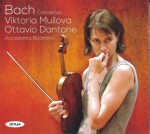 Violinist Viktoria Mullova is joined by harpsichordist Ottavio Dantone and the Accademia Bizantina on a new Onyx CD of Bach Concertos (ONYX 4114). The two standard solo concertos — the A Minor BWV1041 and the E Major BWV1042 — are here, together with two transcriptions: the E Major Concerto for Harpsichord, arranged for violin in D major; and the Concerto for Two Harpsichords in C Minor, arranged for violin and harpsichord.
Violinist Viktoria Mullova is joined by harpsichordist Ottavio Dantone and the Accademia Bizantina on a new Onyx CD of Bach Concertos (ONYX 4114). The two standard solo concertos — the A Minor BWV1041 and the E Major BWV1042 — are here, together with two transcriptions: the E Major Concerto for Harpsichord, arranged for violin in D major; and the Concerto for Two Harpsichords in C Minor, arranged for violin and harpsichord.
Mullova’s playing is simply beautiful: crisp, clean and light, with a nice sense of space. The slow movement of the E major concerto is particularly lovely. The two transcribed concertos aren’t quite as successful, but are still highly satisfying. The C minor concerto perhaps transcribes better, but both works have really nice third movements, with some particularly dazzling harpsichord passages in the duo concerto.
Beautifully presented in a glossy card folder, this is a simply lovely CD.
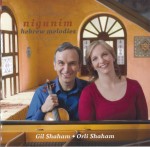 The wonderful Gil Shaham is back with another outstanding CD on his own Canary Classics label, teaming up once again with his sister Orli Shaham for a fascinating recital titled Nigunim – Hebrew Melodies (CC10). It’s a mixture of old and new, with Josef Bonime’s Danse hébraïque and Joseph Achron’s Hebrew Melody and Two Hebrew Pieces bracketing the major work on the CD, Avner Dorman’s Nigunim (Violin Sonata No.3). The Dorman work was commissioned for this recording by the Shaham siblings, who wanted to emphasize the relevance of the Jewish music tradition in today’s world, and it’s a stunning piece, the virtuosity and quality of which quite clearly thrilled the performers.
The wonderful Gil Shaham is back with another outstanding CD on his own Canary Classics label, teaming up once again with his sister Orli Shaham for a fascinating recital titled Nigunim – Hebrew Melodies (CC10). It’s a mixture of old and new, with Josef Bonime’s Danse hébraïque and Joseph Achron’s Hebrew Melody and Two Hebrew Pieces bracketing the major work on the CD, Avner Dorman’s Nigunim (Violin Sonata No.3). The Dorman work was commissioned for this recording by the Shaham siblings, who wanted to emphasize the relevance of the Jewish music tradition in today’s world, and it’s a stunning piece, the virtuosity and quality of which quite clearly thrilled the performers.
The other works on the CD are: John Williams’ Three Pieces from Schindler’s List, the link to the 1940s Poland of their grandparents giving the music a personal relevance for the performers; Leo Zeitlin’s Eli Zion, transcribed by Joseph Achron from the original 1914 piece for cello and piano; and Ernest Bloch’s three-movement Baal Shem, the terrific performance of which features a particularly glorious Nigun central movement.
The Shahams grew up with this music, and it shows: the violin playing throughout the marvellous CD is rich, warm and idiomatic, and the piano playing always sympathetic and perfectly attuned.
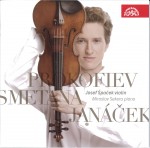 The young Czech violinist Josef Špaček has a new CD on the Supraphon label, pianist and fellow Czech Miroslav Sekera joining him in a recital of works by Janáček, Smetana and Prokofiev (SU 4129-2). Both players are clearly very much at home in the Janáček Sonata for Violin and Piano and Smetana’s From the Homeland: Two Pieces for Violin and Piano, but Špaček shows a remarkable affinity for the music of Prokofiev as well. The Sonata for Solo Violin Op.115 is a relatively short but charming work and Špaček gets it absolutely right, with a perfect mix of lyrical and spiky percussive playing in the opening movement, a lovely Theme and Variations middle movement and a nicely contrasted — and not too fast! — finale.
The young Czech violinist Josef Špaček has a new CD on the Supraphon label, pianist and fellow Czech Miroslav Sekera joining him in a recital of works by Janáček, Smetana and Prokofiev (SU 4129-2). Both players are clearly very much at home in the Janáček Sonata for Violin and Piano and Smetana’s From the Homeland: Two Pieces for Violin and Piano, but Špaček shows a remarkable affinity for the music of Prokofiev as well. The Sonata for Solo Violin Op.115 is a relatively short but charming work and Špaček gets it absolutely right, with a perfect mix of lyrical and spiky percussive playing in the opening movement, a lovely Theme and Variations middle movement and a nicely contrasted — and not too fast! — finale.
Both players are in dazzling form in Prokofiev’s Sonata for Violin and Piano No.1 in F Minor, Op.80, from the lovely wispy violin scales over the slow, deep bass piano octaves of the first movement, through the percussive second movement to the brilliant Allegrissimo finale and the return to the mysterious mood of the sonata’s opening bars.
The great sound and balance contribute to an outstanding CD.
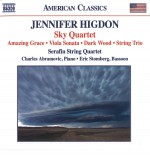 Jennifer Higdon, who recently turned 50, is firmly established as one of the leading contemporary American composers. With Early Chamber Works (8.559752) Naxos has added a fascinating retrospective CD to its American Classics series, presenting première recordings, made in association with the composer, of five works from the formative years of Higdon’s career. They are all finely crafted and very accessible.
Jennifer Higdon, who recently turned 50, is firmly established as one of the leading contemporary American composers. With Early Chamber Works (8.559752) Naxos has added a fascinating retrospective CD to its American Classics series, presenting première recordings, made in association with the composer, of five works from the formative years of Higdon’s career. They are all finely crafted and very accessible.
The Serafin String Quartet opens the CD with a short but lovely setting of Amazing Grace, followed by the Sky Quartet, a four-movement work inspired by the immensity and beauty of the Western U.S. sky. The quartet’s violist Molly Carr is joined by pianist Charles Abramovic for the early — and really beautiful — Sonata for Viola and Piano from 1990, and bassoonist Eric Stomberg joins a standard piano trio line-up for Dark Wood, a short piece that Higdon describes as exploring the bassoon’s virtuosic abilities as well as respecting its soulful nature.
Members of the Serafin Quartet perform the earliest work on the CD, the String Trio from 1988; it’s a terrific work that draws an interesting comment from Higdon, who says it “reveals a young composer in the process of finding her own voice. The language is restless and searching, and even the arrival points do not feel quite settled.” She calls it “a good place to be if you are a developing composer.”
And an even better place to be if you are an interested listener!



